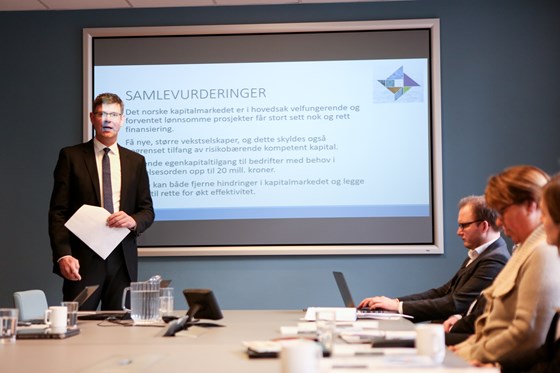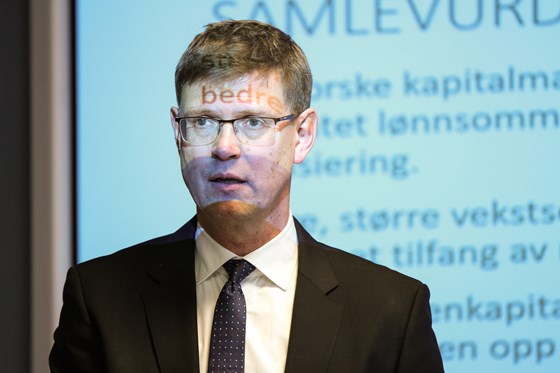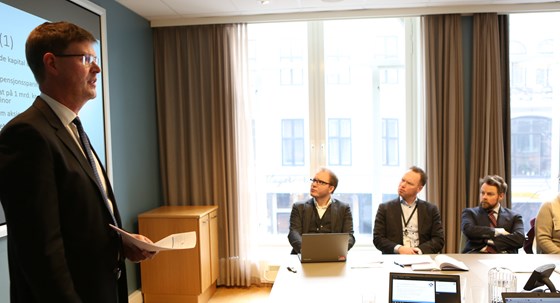Capital in a time of change
Historical archive
Published under: Solberg's Government
Publisher: Ministry of Trade, Industry and Fisheries
Press release | Date: 02/03/2018
Press release from the Capital Access Commission

Today, the commission that has considered access to capital for Norwegian businesses submitted its report to Minister of Trade and Industry Torbjørn Røe Isaksen.
‘Overall, the Norwegian capital market seems to be working well, but the Commission nonetheless sees several areas where there may be a potential for improvement,’ says chair of the Commission Aksel Mjøs.
A well-functioning capital market means that businesses and projects that are profitable or are expected to become profitable in future have access to financing – and to the right financing at the right cost. Correspondingly, a well-functioning capital market means that businesses and projects that cannot offer investors and lenders a satisfactory risk-adjusted return will find it challenging to get access to capital.
There are many indications that the Norwegian capital market is largely well-functioning. The Commission is nevertheless of the opinion that it may be possible to allow for a better channelling of the available capital and a more efficient connection of entrepreneurs and businesses that seek financing and capital owners seeking investment opportunities.

How efficiently the sides of the capital market are connected depends on access to information, among other things. The challenges associated with access to information are particularly noticeable for unlisted shares. The Commission therefore proposes several measures to mitigate information problems, particularly using digital registers and meeting places.
The Commission is of the opinion that a substantial proportion of Norwegian pension assets are not optimally managed considering the objective of maximising the risk-adjusted return. The Commission therefore proposes measures to allow pension savers who so wish to take higher risks in their pension saving. This could potentially contribute more financing to Norwegian businesses. The Commission also proposes measures allowing for more of the capital placed in foundations to contribute to financing Norwegian business and industry.
The tax system also has a bearing on the connection between capital seekers and capital owners. Therefore, the Commission has considered the effect of the tax system on access to capital. From a capital access perspective, the Committee's proposals include abolishing the wealth tax and, alternatively, replacing it with other taxes with a less negative impact on access to capital, and allowing for the share savings account scheme to also include unlisted shares.

The authorities play an important role as regulator by ensuring trust in the financial system. In addition, the Norwegian State is a significant investor on the Oslo Stock Exchange, and is directly involved in the capital market by providing equity, loans, guarantees and support schemes for Norwegian business and industry at large. The State has a particular involvement in relation to early-stage enterprises. The Commission is of the opinion that public policy instruments should be better systemised and made more effective and accessible. Based on an overall review of the access to venture capital, the Commission also recommends that the State contributes by allocating NOK 1 billion to a new, flexible fund of funds venture mandate by reallocating funds already set aside for Investinor.
‘Although the Norwegian capital market mainly works well, the Commission sees that there may be challenges for growth companies with a long and demanding development phase. The State can play a part by investing together with competent private owners. This can in turn help bring about more such competent private owners, which is crucial if we are to increase the number of value-creating growth companies in Norway,’ says Commission chair Aksel Mjøs.
Other measures proposed by the Commission include:
- A permanent, flexible and better managed seed capital scheme
- Facilitating crowdfunding for the purposes of both equity and loans
- More efficient liquidation and restructuring procedures
- More disciplined public ownership
Read the Capital Access Commission’s report here
Press contact:
- Aksel Mjøs, tel.: (+47) 970 88 529
Commission members:
- Aksel Mjøs (chair), associate professor at the Norwegian School of Economics and chairman of the board of the Kavli Trust
- Harald Ellefsen, advocate and partner in the law firm Steenstrup Stordrange (SANDS) and member the board of directors of Kverva
- John Giverholt, former CEO of Ferd
- Maria Borch Helsengreen, partner in Ernst & Young (EY)
- Torbjørn Hægeland, Executive Director of Financial Stability, Norges Bank
- Mai-Lill Ibsen, chair of the board of directors of GIEK Kredittforsikring
- Jøril Mæland, associate professor and head of the Department of Finance at the Norwegian School of Economics (NHH)
- Tina Steinsvik Sund, member of the board of directors of Argentum
- Tellef Thorleifsson, partner in Northzone
Facts about the Capital Access Commission